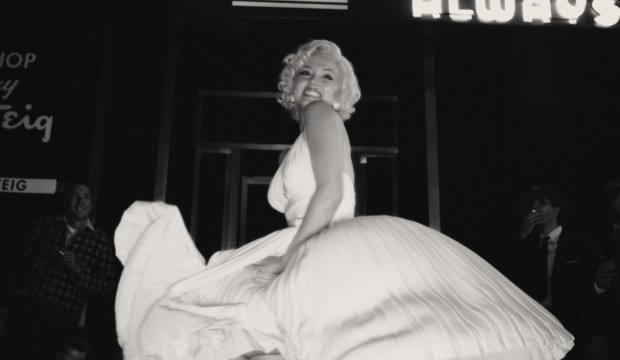
Norma Jeane is constantly torn between herself and The Studio creation of Marilyn Monroe. One is her true self, to which only a few have access; the other is like patriarchal property, burdened with male presumptions that fit her brainless stereotype. When she discusses Chekhov and Dostoyevsky, men scoff in disbelief. They presume and want the dumb blonde bombshell.
Through this near-three-hour film, Norma Jeane’s sense of identity fractures into fragile, reflective shards. Dominik arranges these pieces into an order, yet with a disorientating flow: mixing colour and black and white together, expanding and collapsing the frame with different aspect ratios.

Ana de Armas as Norma Jeane Baker/Marilyn Monroe. Photo: Netflix
Norma Jeane's adolescence is scrapped (cutting her first marriage to James Dougherty entirely), but the film opens with her early childhood. She grows up with a mentally unstable mother (a constantly fraught Julianne Nicholson) and an enigmatically absent father, the latter represented by a talking photograph.
Flicking through her modelling career and settling into her twenties (portrayed by Ana de Armas), the film shows Norma Jeane's traumatising break into acting with a scene that quickly cuts into your soul. De Armas embodies the Marilyn everyone has seen on screen, beautifully balanced with Norma Jeane struggling above those waves of exploitative smiles. It’s an arresting, tortured performance that locks you into her character's prison of perception.
Norma Jeane engages in a fun, scopophilic ménage à trois with Charlie Chaplin’s son Cass (Xavier Samuel) and Double Indemnity actor Edward G. Robinson. This is prior to her second and third marriages to the baseball legend Joe DiMaggio (Bobby Cannavale) and the playwright Arthur Miller (Adrien Brody).
In a film that thrives in nightmarish chaos, some of its strongest scenes are the quietest: especially when Norma Jeane meets DiMaggio and Miller (referred to in the credits as 'The Ex-Athlete' and 'The Playwright'). Cannavale perfectly captures that conservative alpha masculinity; Brody creates an impatient but vulnerable creativity, in the film’s finest performance after de Armas.

Adrien Brody and Ana de Armas as The Playwright and Norma Jeane. Photo: Netflix
It
should be restated here that Blonde isn’t a biopic: the intentions of
both Dominik and Oates were to make a fictionalised version of Monroe’s life. Scenes
between these famous figures, including a particularly distressing scene with JFK
(Caspar Phillipson), shouldn’t be taken too literally – despite the
real-life rumours. They’re thematic means to Norma’s tragic ends, demonstrating
the misogynistic titillation and control of vulnerable women.
What makes Dominik so appealing as a filmmaker is his courage to present events in this way: severing decency and politeness to create a piece that shatters convention. It’s refreshing, even with the queasier, more provocative scenes.
However, despite its overwhelming qualities, Blonde faces a problem. It isn’t the graphic nature of Norma’s tortures, but the constant torrent with which they flood the film. Happiness arises at brief points, but the superior onslaught of misery approaches a portrait of a woman defined only by sex and trauma. It's not so simplistic, but is it naive and childish to want more moments of genuine joy?
Dominik isn’t up there with the Great Directors, but his tireless tenacity and poetic thrust engender a film that's beyond anything a formulaic biopic could've achieved. Blonde is undeniably powerful: chucking you inside a black and hellish cloud that evolves into an unforgettably upsetting storm. A storm that stays with you long after the credits roll.
Blonde is available on Netflix from Wednesday 28 September.
| What | Blonde, Netflix review |
| When |
28 Sep 22 – 28 Sep 23, ON NETFLIX |
| Price | £n/a |
| Website | Click here for more information |






